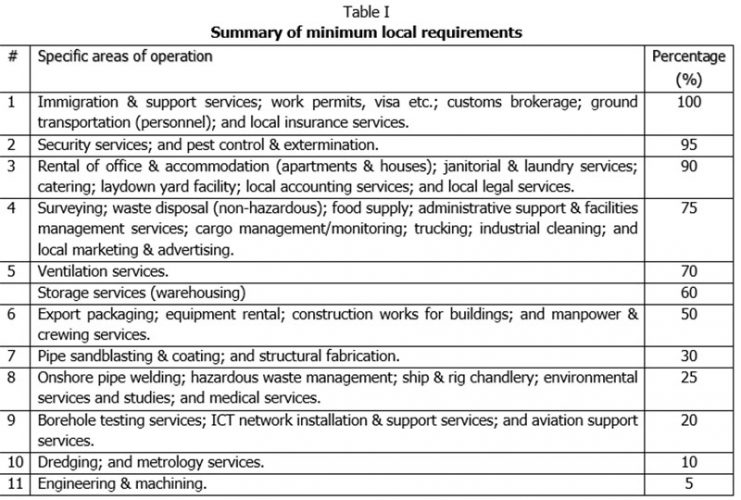Going forward, we will continue to partner with you on inclusive democracy, economic development, and citizen security for all Guyanese, and to promote the public values of – transparency, diversity, equity, inclusion, and accessibility – values that inform policies reflecting good governance and a participatory democracy where all voices are heard.
U.S. Ambassador Sarah-Ann Lynch
Ramps Logistics Guyana Inc., a company that provides support services to the oil and gas sector, was denied certification under the recently passed local content legislation. This was because of its alleged failure to provide accurate information to the Local Content Secretariat in addition to not meeting the requirement of 75 percent Guyanese on its board of directors. Up to three months ago, the company was 100 percent Trinidad-owned but has divested 51 percent of its shares to a Trinidadian who was granted Guyanese citizenship. According to media reports, the authorized share capital of the company is 100 ordinary shares of G$1 each, while the issued share capital is US$1,960,680. However, no evidence was presented to the Secretariat of any amendment to the Articles of Incorporation to increase the authorized share capital.
In a recent letter to the Editor, Mr. David Patterson, former Minister of Public Infrastructure, stated that during the consideration of the Local Content Bill, the Opposition had expressed several concerns and had made certain suggestions for an amendment to the Bill before its passage in the National Assembly. These include:
As an interim measure, the interpretation of a Guyanese national should be based on citizenship by birth to allow existing Guyanese nationals to benefit from the provisions of the Local Content Act immediately. Shortly thereafter, a comprehensive citizenship amendment should be tabled to include residency requirements, as required by most countries; and
A contractor, sub-contractor or licensee should not enter into any contract in excess of three years to allow local firms to develop capacity in order to bid for future contracts. At the moment, contracts of between 5-10 years are being awarded. As such, the next available opportunity for an emerging local logistics company to win the Exxon contract will at minimum be 2027.
Another area relates to whether the Act is not in conflict with Article 7 of the revised Treaty of Chaguaramas that prohibits any discrimination on grounds of nationality only. Mr. Patterson also referred to concerns that the naturalization process is susceptible to corrupt practices.
The Attorney General responded to Mr. Patterson’s letter by stating that the suggestion at (a) above conflicts with Articles 44 and 149 of the Constitution. The latter prohibits discrimination while the former provides for a person to be eligible for Guyanese citizenship if his/her father or mother is a Guyanese citizen. Why this was not explained during the consideration of the Bill, is not clear.
In today’s article, we discuss the key requirements of the Local Content Act No. 18 of 2021 which was passed by the National Assembly on 29 December 2021 and which received presidential assent two days later.
Objectives of the Act
The objectives of the Act are:
To provide for the implementation of local content obligations by persons engaged in petroleum operations and related activities;
To give priority to Guyanese nationals and companies in the procurement of goods and services in the value chain of the petroleum operations;
To enable local capacity development;
To promote competitiveness and to encourage the creation of related industries to sustain social and economic development in Guyana; and
To provide for investigation, supervision, coordination, monitoring and evaluation of, and participation in, local content in Guyana.
The Act defines local content as ‘the monetary value of inputs from the supply of goods, or the provision of services, by Guyanese nationals and Guyanese companies and incudes local capacity development’. It also defines the following requirements for a company to be considered a Guyanese company:
The company must be incorporated under the Companies Act;
It must be beneficially owned by Guyanese nationals who ultimately exercise, individually and jointly, voting rights representing at least 51 percent of the issued share capital of the company;
It must have Guyanese nationals holding at least 75 percent of executive and senior management positions and at least 90 percent of non-managerial or other positions; and
Any partnership between Guyanese nationals and a company constituted as above in accordance with the Partnership Act.
As regards (a), it may have been more appropriate for there to be a qualifying period within which a company wishing to offer its services in the oil and gas sector has been incorporated, for example, a minimum of three years. This would have allowed existing local companies to benefit from the award of contracts almost immediately. While we nonetheless acknowledge that such entities may not have the desired financial resources, a partnership or joint venture arrangement between a foreign company and local one could be established, consistent with (d). This would prevent “fly by night” companies with heavy overseas backing to be incorporated to provide the services.
Responsibilities of the Minister
The Minister for petroleum is responsible for, among others: (i) approving the Local Content Master Plan (which is a five-year plan) and the Local Content Annual Plan after consultation with the Secretariat; (ii) prescribing rules on local content measurement and certification; (iii) establishing and collaborating with stakeholders on local content matters; (iv) setting priority areas for focus and minimum targets for local content implementation; and (v) reporting to the National Assembly on local content implementation.
Local Content Secretariat
The Local Content Secretariat is headed by a Director and such other staff appointed by the Minister from persons of integrity and good professional standing. Its main responsibility is to develop and implement measures for the effective implementation of local content by contractors, sub-contractors and licensees as well as strategies that will give preference to, or ensure equal treatment of, Guyanese nationals and Guyanese companies.
Local Content Registers
The Secretariat is required to maintain Local Content Registers of Guyanese nationals being employed for each company operating in the oil and gas sector as well as of Guyanese nationals and companies that provide goods and services for the said sector. All such nationals and companies are to apply for a certificate of registration. Guyanese nationals and companies offering such services prior to the commencement of the Act are given six months to comply with this requirement. The certificate of registration, once issued, is renewable annually upon application.
A Guyanese national or a Guyanese company must immediately notify the Secretariat of any change in the status of the national or the composition of the company that contravenes the Act. The failure to do so constitutes an offence, punishable by a fine of $1 million (for a national individual) and $5 million (for a company), as well as removal from the registers. The Local Content Registers are to be published on the Ministry’s website and any other media of wide circulation.
First Schedule
The first schedule to the Act sets out the minimum requirements for local content levels in relation to the procurement of goods and services as well as local capacity development. In total, there are 40 areas, with local participation ranging from 5 percent to 100. Table I provided a summary of the minimum requirements which have to be met by the end of the year.
Subject to negative resolution by the Assembly, the Minister may amend the above Schedule. The Minister may also waive any of the minimum requirements if he/she considers it necessary to do so in the national interest, or where the contractor, sub-contractor or licensee is unable to obtain the minimum local content requirements by virtue of the absence of local capacity. The Minister’s waiver extends to a situation where compliance with the Master Service Agreement immediately prior to the commencement of the Act prevents the contractor, sub-contractor or licensee from complying with the requirements of the Schedule. The Act defines the Master Service Agreement as ‘a contract that facilitates the ongoing relationship between a service provider and a Contractor, Sub-contractor or Licensee by detailing each party’s ongoing duties and obligations in relation to their petroleum operations’.
Local Content Plans and Report
Within four months of the commencement of operation of the Act, or within four months of the grant or transfer of interest in a licence or entering into a petroleum agreement with the Minister, a contractor, sub-contractor or licensee is required to submit a Local Content Master Plan for approval. The Plan must be updated every five years. Any subsequent changes to the Plan due to unforeseen circumstances must be submitted to the Minister for review and approval. The Secretariat is to develop guidelines relating to such changes.
The Master Plan is to include sub-plans relating to employment; procurement; capacity development; quality and quantity criteria for the procurement of goods and services; and the estimated value of local content to be acquired. Specific details relating to these sub-plans are set out in the Second Schedule to the Act. An annual plan in support of the Master Plan is to be prepared and submitted to the Minister within 60 days prior to but not later than 30 days after, the beginning of the calendar year. Contractors, sub-contractors and licensees that operated prior to the commencement of the operations of the Act have up to 60 days to submit their annual plans. All Local Content Plans are to be published on the Ministry’s website or any other media of wide circulation.
Contractors, sub-contractors and licensees must file a local content report within 30 days of the end of each half-year, outlining compliance with the approved minimum local content requirements. Other matters dealt with under this section include: procedures for bid evaluation incorporating local content; submission of Master Services Agreement; and knowledge skills and technology transfer.
Monitoring, evaluation and reporting
The Secretariat is responsible for monitoring and evaluating the petroleum operations of a contractor, sub-contractor or licensee for compliance with the Act. This is done through appropriate auditing procedures. Contractors, subcontractors and licensees are required to maintain local content data prescribed by the Secretariat and to submit a performance report on local content within 45 days of the commencement of the calendar year in respect of the preceding year. After review by the Secretariat, a certificate of compliance or non-compliance is issued.
The Secretariat is also required to prepare and submit to the Minister a report that includes specific details relating to local content activities and achievements pertaining to each Contractor, sub-contractor and licensee. After reviewing the report, the Minister shall cause it to be laid in the Assembly.
Local content advisory committee
The Act establishes a Local Content Advisory Committee comprising no less than seven persons appointed by the President from 19 governmental and non-governmental agencies. Its main function is to provide support to the Secretariat in discharging its responsibilities and to make recommendations to the Minister.
Offences and penalties
It is an offence to knowingly provide false or misleading information in relation to a Local Content Plan, report, record or any other information pursuant to the Act, punishable on summary conviction to a fine of $1 million in the case of an individual and $10 million in the case of a body corporate. The same applies to a Guyanese national and a Guyanese company who/which aids or abets the commission of above offence.
There are other prescribed penalties for other individuals and entities for violating the requirements of the Act, such as the carrying out of petroleum operations without ensuring that the minimum local content requirements are met. The fine for such an offence is $50 million.










